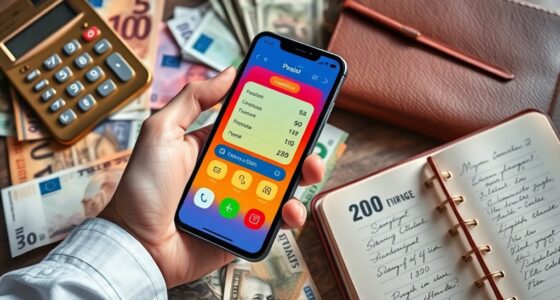To transfer money internationally at low cost, compare online transfer services, peer-to-peer apps, and digital currencies for quick, affordable options. Bank wire transfers are secure for large sums but tend to be pricier and slower. Digital wallets and blockchain tech can cut fees and speed up transfers. Be mindful of exchange rates to avoid losses, and choose methods suited to your transfer size and urgency. Keep exploring to discover more tips for affordable, safe global money moves.
Key Takeaways
- Use online money transfer services with low fees and favorable exchange rates for cost-effective international transactions.
- Consider peer-to-peer payment apps or cryptocurrencies for fast, low-cost transfers bypassing traditional bank fees.
- Opt for digital wallets and blockchain-based remittance platforms to reduce costs and speed up transactions.
- Avoid traditional methods like checks or money orders due to higher costs and slower processing times.
- Transfer funds during favorable currency market conditions to minimize exchange rate losses and maximize savings.
Bank Wire Transfers: Pros and Cons
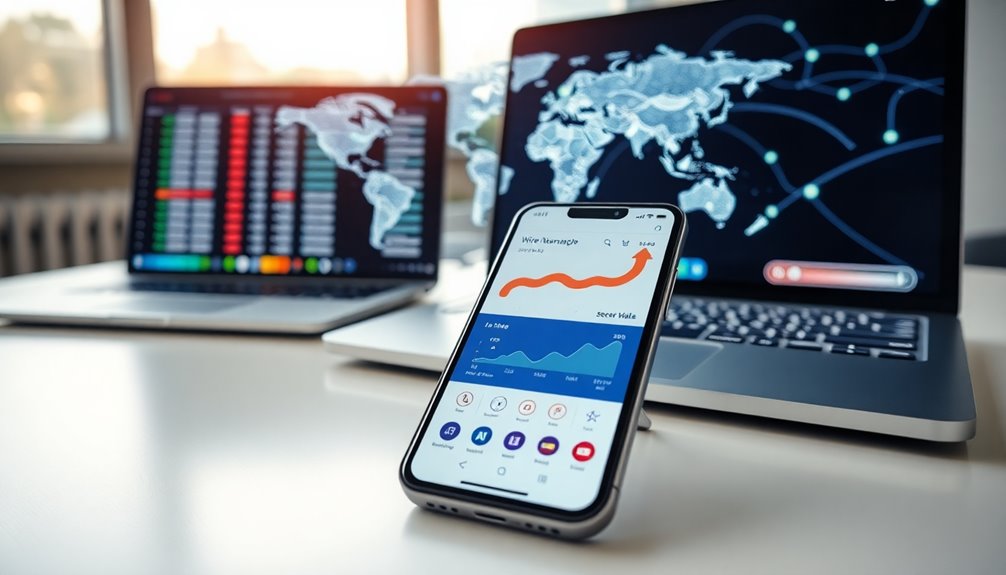
Bank wire transfers are a popular method for sending money internationally because they’re quick and secure. When you choose this option, bank security is a key advantage; your funds are protected through robust protocols. However, transfer limits can be a drawback, as many banks impose maximum amounts per transaction or daily limits, which may require multiple transfers for larger sums. While wire transfers are reliable and widely accepted, they often come with higher fees compared to other methods. Additionally, processing times can vary, sometimes taking several days to complete. If you’re sending smaller amounts frequently, wire transfers might feel inconvenient due to these limits and costs. Moreover, understanding industry trends can help you decide whether wire transfers remain the most cost-effective option for your needs. For example, some regional differences in banking regulations can influence transfer procedures and costs. Overall, they’re an effective choice for large, secure transactions but less ideal for smaller, regular transfers. Considering interest rates and fees is essential when choosing the best method for your international money transfer needs.
Online Money Transfer Services: Comparing Popular Platforms

When choosing an online money transfer platform, you’ll want to compare transfer fees and overall costs to find the best deal. Speed and convenience matter too, as some services deliver funds faster and with simpler processes. By evaluating these factors, you can select a platform that fits your needs and budget perfectly. Considering the cost-efficiency of different services can help you save money on every transfer. Additionally, understanding the application timing for different transfer methods ensures your money arrives when needed and maximizes your savings. Staying informed about emerging transfer trends, such as mobile app integration and local partnerships, can further enhance your experience. Incorporating mindful decluttering strategies related to financial stress management can also promote better decision-making during transfers.
Transfer Fees and Costs
Have you ever wondered how much of your money goes toward transfer fees when sending funds internationally? Transfer fees vary widely depending on the platform you choose, so it’s essential to compare costs carefully. Many services charge a flat fee, while others take a percentage of the transfer amount. Keep in mind that currency exchange can also add to your costs; some platforms offer better rates than banks. Additionally, transfer regulations in different countries may influence fees or impose limits, affecting your total cost. Always check for hidden charges or variable fees that might not be immediately obvious. By understanding these factors, you can choose a service that minimizes costs and ensures your money reaches its destination efficiently. Moreover, considering the availability of the platform in your country can impact transfer options and fees. Understanding the effectiveness of different transfer methods can help you select the most reliable option for your needs.
Speed and Convenience
Choosing the right online money transfer platform can substantially impact how quickly and conveniently you send funds internationally. Fast transfer speed means your money reaches the recipient promptly, which is vital in urgent situations. Platforms with strong bank security ensure your transactions are protected from fraud or hacking, giving you peace of mind. Many services now offer instant transfers or same-day delivery, making the process seamless. Convenience also involves user-friendly interfaces, multiple payment options, and real-time tracking. Some platforms integrate with mobile apps for on-the-go transfers, while others require minimal setup. By selecting a service that prioritizes transfer speed and bank security, you can send money efficiently without sacrificing safety or ease of use. Additionally, understanding essential oils for safety can help you better protect your financial information during online transactions. Being aware of tuning options for Ford vehicles can also help you optimize your vehicle’s performance post-transfer, if you’re upgrading or customizing your ride.
Peer-to-Peer Payment Apps for International Transfers
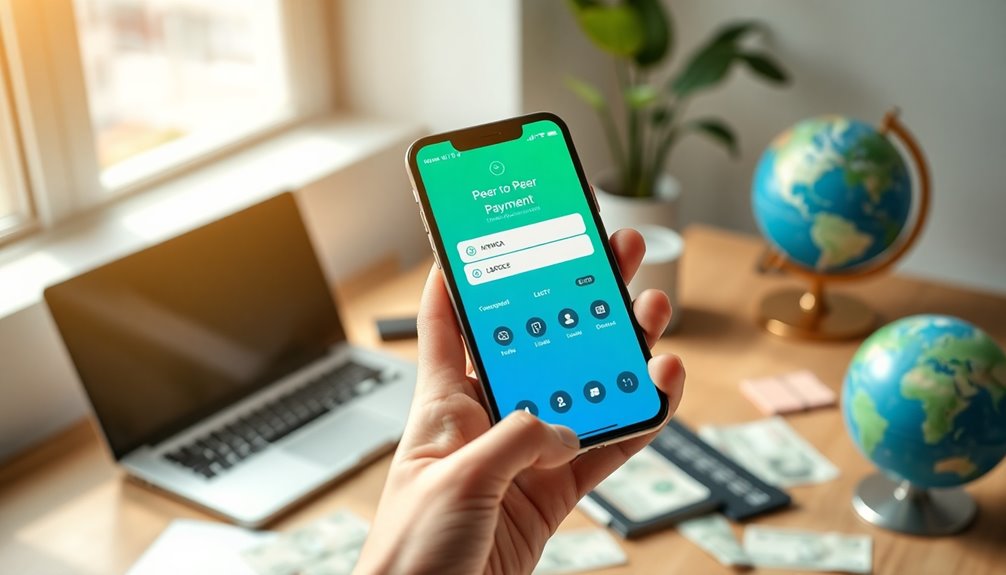
Peer-to-peer payment apps have revolutionized the way you send money across borders by offering quick, low-cost solutions that bypass traditional banking channels. Many of these apps now support international transfers, making it easier to send money directly to friends or family abroad. As cryptocurrency adoption grows, some apps incorporate digital assets to facilitate transfers, though traditional fiat options remain dominant. Mobile app security is vital—look for apps with strong encryption, two-factor authentication, and regular security updates to protect your funds and personal data. Security measures are essential to safeguarding your financial information during such transfers. Additionally, understanding the fee structures and exchange rates offered by these apps can help you maximize savings and avoid unexpected costs. Being aware of the privacy policies associated with these services can also help you make informed decisions about your data sharing. Many apps also include tracking features that allow you to monitor your transfer status in real-time, adding an extra layer of transparency. To ensure safe and efficient transactions, it’s important to consider regulatory compliance and the legal protections offered by each platform. Overall, peer-to-peer payment apps are a convenient, affordable way to handle international transactions without the hassle of banks.
Using Cryptocurrency for Cross-Border Payments
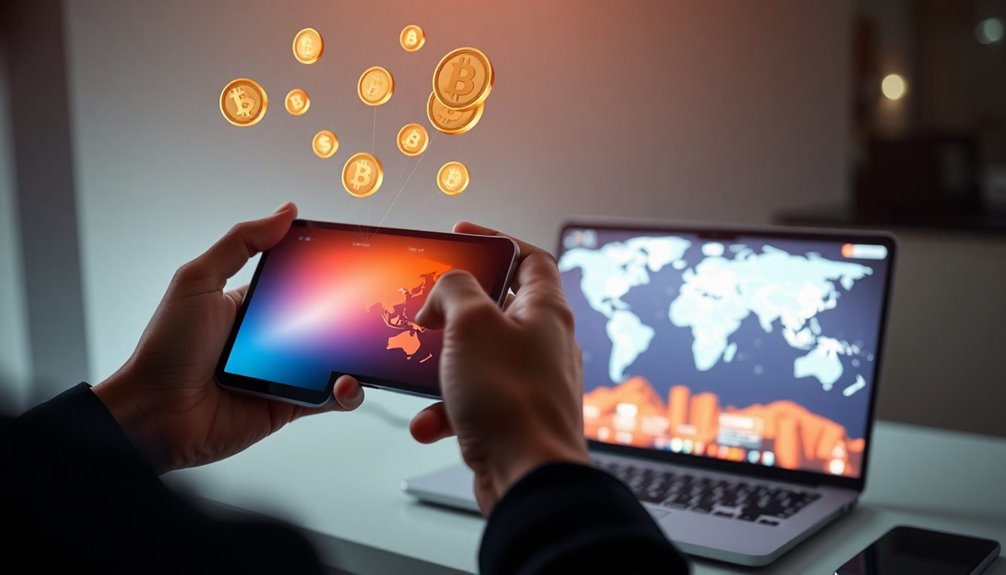
Using cryptocurrency for cross-border payments offers a fast and cost-effective alternative to traditional banking methods. Transactions happen directly on blockchain networks, which provide strong blockchain security features, reducing fraud risks. You can transfer funds quickly without relying on intermediaries, often completing transactions within minutes. Additionally, enhancing life at home for the elderly through innovative financial solutions can help ensure financial security and independence as they age. This approach can also mitigate some of the AI vulnerabilities associated with digital financial platforms, provided proper safeguards are in place. Furthermore, understanding Bitcoin News Day developments can help users stay informed about potential regulatory changes that may affect their transactions. Being aware of cryptocurrency regulation is crucial, as many countries are updating their legal frameworks to address digital currencies, impacting how users can utilize them. However, it’s vital to consider cryptocurrency regulation in your country, as rules vary widely and can impact your ability to use digital currencies legally. Staying informed about local laws ensures you remain compliant and avoid potential penalties. While cryptocurrencies can considerably lower transfer costs and increase speed, always choose reputable platforms that prioritize security and adhere to regulations. This way, you enjoy the benefits of a modern, efficient payment method without unnecessary risks.
International Money Orders and Checks: Are They Still Viable?

International money orders and checks still offer a sense of security and reliability for some users, but they often come with higher costs and slower processing times. You might find them less convenient compared to digital options, especially for quick transfers. You might also consider the processing times involved, which can significantly delay the transfer completion compared to electronic methods. Understanding the cybersecurity vulnerabilities associated with traditional methods can help you weigh the risks of data breaches or fraud. It’s worth considering whether their benefits outweigh the drawbacks in today’s fast-paced world. Additionally, expiration of paper financial instruments can impact their validity over time. Furthermore, the privacy and security concerns associated with traditional methods may influence your choice. Incorporating cost of transaction considerations is essential, as these methods tend to be more expensive than electronic alternatives.
Security and Reliability
Although international money orders and checks have long been trusted methods for transferring funds, their security and reliability are increasingly questioned in today’s digital age. Cybersecurity threats and fraud prevention become major concerns, as scammers find new ways to exploit these traditional methods. Money orders and checks can be lost, stolen,, or forged, risking your funds’ safety. Additionally, delays in processing can leave you uncertain about your money’s arrival. To protect yourself, consider these points:
- They are vulnerable to theft and forgery without proper security measures.
- Fraud prevention relies heavily on manual verification, which can be slow.
- The risk of non-delivery or double payment increases without digital tracking.
- Regular use of glycolic acid products has been linked to improved skin texture and radiance, highlighting the importance of choosing reliable and secure methods for your financial transactions. Moreover, the absence of digital tracking features can complicate dispute resolution and increase the potential for fraud.
While still viable in some cases, their security and reliability are no longer as guaranteed as modern digital transfers.
Cost and Convenience
Are international money orders and checks still cost-effective and convenient options today? Not really. They often involve high fees, especially when considering exchange rate fluctuations, which can eat into your funds. Plus, the transfer speed is slow—taking days or even weeks to reach the recipient—making them less practical for urgent needs. Checks can get delayed or lost in the mail, adding to the inconvenience. While they might seem straightforward, electronic transfers now offer faster, cheaper, and more secure alternatives. If you want to save money and avoid unpredictable exchange rate impacts, consider digital options like online money transfer services. These methods provide immediate transfer speed and better control over costs, making them a more viable choice in today’s fast-paced world.
Remittance Services for Low-Cost Transfers
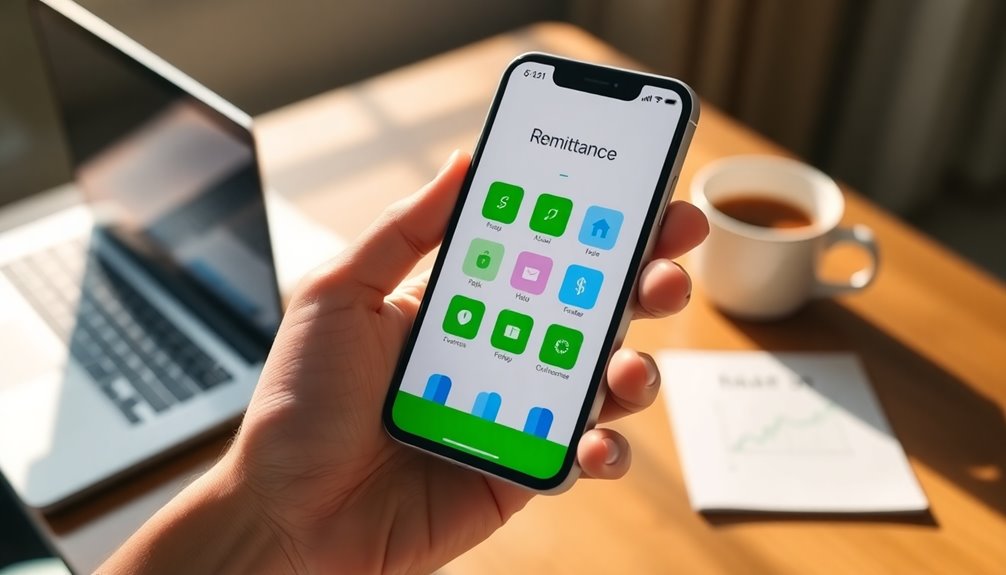
Have you ever wondered how to send money abroad without breaking the bank? Remittance services tailored for low-cost transfers make it easy and affordable. Many platforms now leverage digital wallets, allowing you to send money directly to a recipient’s account or mobile device. Blockchain technology also reduces fees and speeds up transactions by removing middlemen. To get the best deal, look for services that offer transparent fee structures and real-time exchange rates.
Send money abroad affordably with digital wallets, blockchain tech, and transparent, real-time exchange rates.
- Use digital wallets for quick, low-cost transfers
- Choose services utilizing blockchain tech for faster processing
- Compare platforms for minimal fees and favorable rates
Mobile Money Solutions in Developing Countries

Mobile money solutions are changing how people in developing countries access financial services, especially in remote areas. They make transactions more affordable and easier, reducing the need for physical banks. By doing so, they help bring more people into the financial system and improve economic opportunities.
Accessibility in Remote Areas
In many developing countries, reaching remote areas with traditional banking infrastructure remains a significant challenge, making financial inclusion difficult for residents. Mobile money solutions have emerged as a practical alternative, but accessibility still depends on several factors. Limited digital literacy can hinder users from effectively navigating mobile platforms, while cultural barriers may influence trust and willingness to adopt new technology. To improve access, governments and organizations are implementing training programs that teach digital skills and promote understanding. Additionally, simplified user interfaces and local language options help overcome language barriers. These efforts ensure more residents can send and receive money securely, even in hard-to-reach locations, bridging the gap created by physical distance and infrastructure limitations.
Cost-Effective Transactions
As efforts increase to expand financial access in remote areas, cost remains a key factor influencing the adoption of mobile money solutions. These platforms often offer lower transaction fees compared to traditional banks, making international transfers more affordable. They also simplify currency exchange, allowing you to convert funds at competitive rates, reducing extra costs. Transaction security is a critical aspect; reputable mobile money providers use encryption and secure protocols to protect your data and funds. By choosing solutions that prioritize security and minimize fees, you can transfer money internationally without excessive expenses or risks. Mobile money solutions therefore provide a cost-effective way to send and receive funds, especially in developing countries where traditional banking options might be limited or costly.
Enhancing Financial Inclusion
How can mobile money solutions transform financial access in developing countries? They boost financial inclusion by providing affordable, easy-to-use digital banking services to those without traditional bank accounts. Mobile money platforms empower you to send and receive money, pay bills, and save, all from your phone. This broadens access to financial services, especially in remote areas. To make the most of these solutions, improving your financial literacy is vital, helping you understand digital banking features and security. Mobile money also reduces reliance on cash, lowering theft risks and transaction costs. By embracing mobile money, you gain more control over your finances and connect to the global economy.
- Increased access for unbanked populations
- Simplified money management through digital banking
- Greater financial literacy promotes responsible use
How to Minimize Exchange Rate Losses

To minimize exchange rate losses when transferring money internationally, you need to be strategic about timing and method. Exchange rate fluctuation can considerably impact how much money the recipient finally receives. Monitoring currency trends allows you to choose the best moments for conversion, avoiding periods of high volatility. Using currency conversion strategies like forward contracts or locking in rates can protect you from sudden drops. Additionally, some transfer services offer better rates or fixed rates for certain amounts, helping you reduce the impact of unfavorable fluctuations. By staying informed about market movements and selecting the right tools, you can lower the costs associated with currency exchange. This proactive approach ensures your money retains its value during international transfers.
Choosing the Right Transfer Method for Large Sums
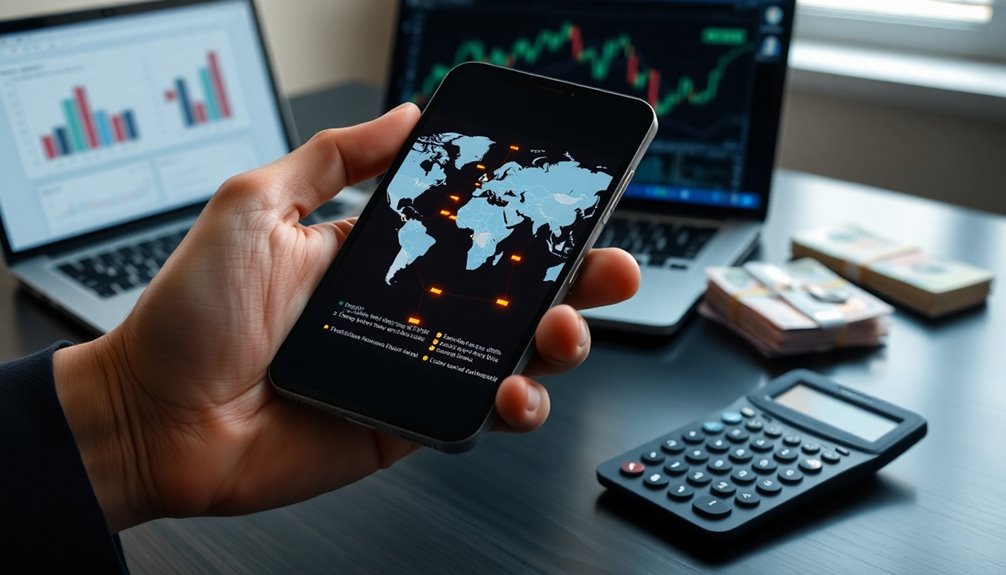
When transferring large sums internationally, selecting the right method can make a significant difference in cost and security. You need to evaluate factors like currency exchange rates and transfer limits to choose the best option. Some methods, like bank wire transfers, offer high transfer limits and secure transactions but may have higher fees. Alternatively, specialized money transfer services often provide better currency exchange rates and lower costs for large amounts.
- Compare transfer limits to avoid delays or needing multiple transactions
- Check currency exchange rates to maximize the amount received
- Consider provider security measures for peace of mind
Tips for Ensuring Safe and Secure International Transactions

Ensuring your international transactions are safe and secure is essential to protect your funds and personal information. Start by verifying the legitimacy of the transfer service and look for providers with strong fraud prevention measures. Always use secure, encrypted websites when entering your details, and avoid public Wi-Fi networks. Enable transaction authentication, such as two-factor authentication, to add an extra layer of security. Double-check recipient details before confirming transfers to prevent errors or fraud. Keep your login credentials confidential and regularly update your passwords. Monitoring your accounts for suspicious activity helps catch issues early. By following these tips, you minimize risks and ensure your money remains safe throughout the transfer process.
Frequently Asked Questions
What Are the Hidden Fees Involved in International Money Transfers?
When you transfer money internationally, you might not see all the costs upfront. Hidden fees often include unlisted charges and exchange rate margins that banks or providers add. These fees can substantially increase your costs without clear disclosure. Always check for unlisted charges and compare exchange rate margins to avoid surprises. Being aware of these hidden fees helps you choose the most affordable transfer method and save money.
How Do Transfer Times Vary Between Different Methods?
Think of your transfer method as a racecourse—some routes sprint, others take a scenic, slow lane. Transfer speed varies widely; bank wires often race ahead with quick processing times, sometimes within hours. Digital platforms might take a day or two, while traditional methods like postal checks crawl over several days. Your choice depends on how urgently you need the funds, balancing speed against cost and convenience.
Are There Limits on Transfer Amounts for Each Service?
You should check each service’s transfer limits before sending money, as they vary widely. Some platforms set daily or monthly caps due to service restrictions or regulatory rules, especially for large amounts. Always review the specific transfer limits for your chosen method, as exceeding these can delay or block your transfer. Being aware of service restrictions helps you plan your transaction efficiently and avoid surprises.
How Do Recipient Countries’ Banking Systems Affect Transfer Costs?
Think of the recipient country’s banking system as the river guiding your money. If the banking infrastructure is like a sturdy canal, transfers flow smoothly, reducing costs. But if it’s a winding, fragile stream, higher fees and delays may occur. Currency exchange rates also play a role, adding or subtracting from what arrives. So, stronger banking systems and favorable exchange rates make your transfer cheaper and quicker.
Can Transfer Methods Be Combined for Better Savings?
You can definitely combine transfer methods to optimize transfer costs. For example, using a digital wallet for smaller payments and a bank transfer for larger amounts helps you save on fees. By blending methods, you leverage each one’s strengths, reducing overall expenses. Always compare options beforehand, and consider timing and currency exchange rates. This approach guarantees you’re making the most cost-effective choices, maximizing your savings with strategic transfer method combinations.
Conclusion
No matter which method you choose, transferring money internationally doesn’t have to be a headache. With the right tools and a little research, you can save a fortune—your wallet will thank you! Whether you opt for online services, cryptocurrencies, or traditional methods, staying informed keeps your transfers safe and cheap. Don’t let high fees or slow processes hold you back—take control and make your money travel smarter than ever before!




